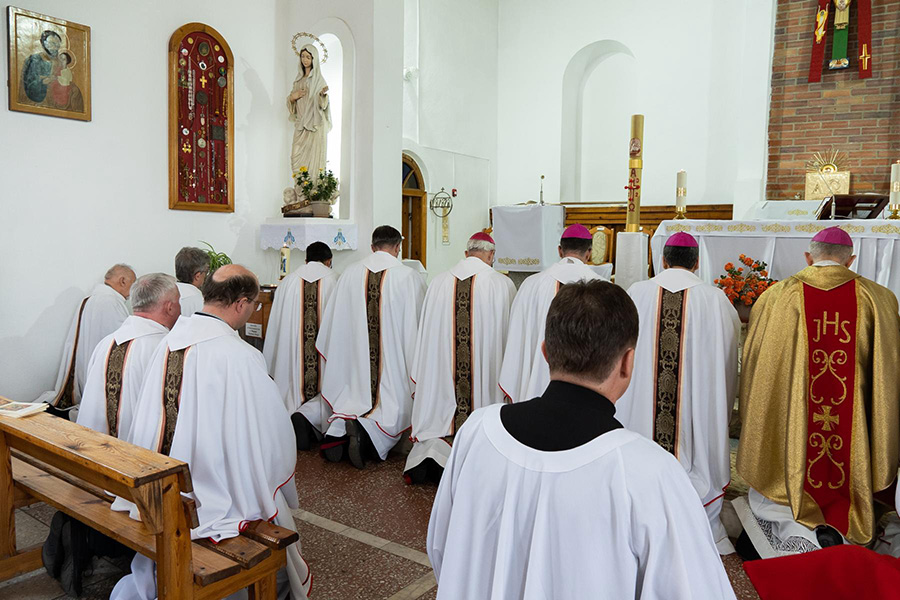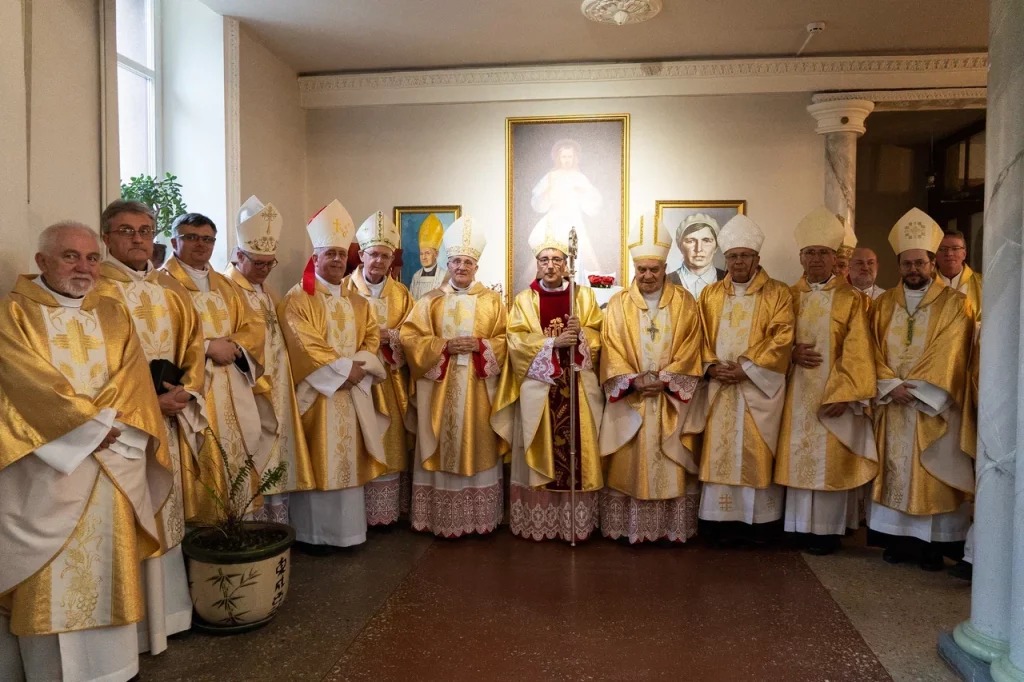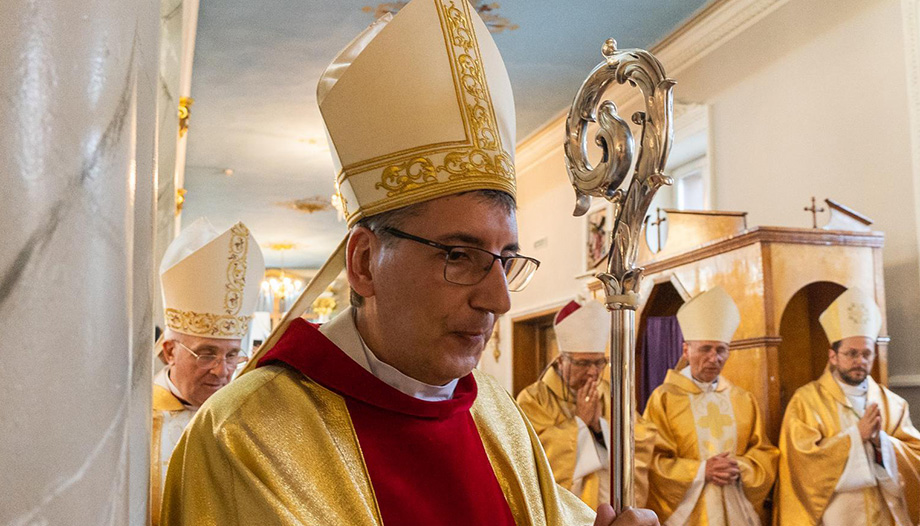Nuncios, bishops and apostolic administrators from Kazakhstan, Kyrgyzstan, Uzbekistan, Tajikistan, Turkmenistan, Azerbaijan, Afghanistan and Mongolia, who make up the newly created Conference of Catholic Bishops of Central Asia, dedicated the vast and multi-ethnic Asian region on May 1 to St. Mary, Queen of Peace, at the National Shrine of the Queen of Peace of Kazakhstan in Ozerny.
From "the center of the Eurasian continent, in the place where representatives of many nationalities and religions live together," the archbishops and bishops called the Virgin Mary "Queen of Peace and Mother of the Church!" and commended to her "the Catholic Church of Central Asia, all Christian believers, who recognize the One God, and people of good will, whose faith and devotion are known to the Almighty."
"Queen of martyrs," they prayed, "look upon the blood and tears of those who, like Christ, suffered innocently for truth and justice. Mary, show us and the whole world that you are the Queen of Peace. May all nations proclaim you blessed and through you find the way to God".
The first session of this Conference of Asian Bishops was held in Nursultan, the capital of Kazakhstan, from April 26 to the beginning of May. In this city, formerly known as Astana, the official opening of the plenary session took place, which was attended by the President of the Senate of the Parliament of the Republic of Kazakhstan, Ashimbaev Maulen Sagatkhanuly, and Kazakhstan's Minister of Information and Social Development, Umarov Askar Kuanyshevich, according to Fides.
Cardinal Luis Antonio Cardinal Tagle, Prefect of the Congregation for the Evangelization of Peoples [until the entry into force of 'Praedicate Evangelium' on Pentecost Sunday], was present in an online connection from Vatican City, expressing his satisfaction for the birth of the Conference, which "is called to play a special role in the life and ministry of the Church in the territories of the countries of Central Asia. Although Catholics in this region are a minority, this does not detract from the importance of the role that the Church plays in society".
Bishop Joseph Louis Mumbiela of Almaty, Kazakhstan's most populous city, and president of the country's bishops' conference, presided over this plenary of the Central Asian bishops, having been elected to preside over the new conference by secret ballot at the meeting of the Central Asian bishops.
Jerzy Maculewicz, Apostolic Administrator of Uzbekistan, and Bishop Evgeny Zinkovsky, Auxiliary Bishop of the Diocese of Karaganda, were elected vice-president and secretary general, respectively. On the day of the official opening of the plenary session, the ordinaries of Central Asia visited the Apostolic Nunciature in Kazakhstan, where they met with the Nuncio, Archbishop Francis Assisi Chullikatt.
Pope Francis' visit to Kazakhstan has been on the agenda since the Holy Father expressed to the country's president, Kassym Khomart Tokayev, his intention to travel to Kazakhstan., on the occasion of the VII Congress of Leaders of World and Traditional Religions, which will take place in September in the Kazakh capital.
In this context, Omnes has talked with Monsignor José Luis Mumbiela SierraPresident of the Central Asian Bishops' Conference.
First of all, tell us about the dedication of Central Asia to the Blessed Virgin Mary at the Shrine of Ozerny, which you, the bishops, have carried out.
- The text is 99% the same as the one used on June 25, 1995 by Bishop Jan P. Lenga, when he consecrated Kazakhstan and Central Asia to Our Lady. The same text was used by John Paul II in 2001 when in Astana, 21 years ago, he also repeated that consecration with the same words. We have changed two words, because in the original it said that we are at the gates of the third millennium, and we are at the beginning. It has been a little tweaked. Before it was Kazakhstan, and now it is Central Asia. And the rest is what was done in 1995, what John Paul II repeated, and we have insisted.
Can you provide us with the text of the dedication to Saint Mary, Queen of Peace?
- Of course. This is the text:
"Prayer: Dedication of Central Asia to the Blessed Virgin Mary.
Mother of the Son of God Jesus Christ and our Mother! We want to express to you our love and respect, our trust and gratitude.
We stand before You at the special moment in human history at the beginning of the third millennium, when humanity strives to be one family, but, nevertheless, remains divided, wounded by many conflicts and wars.
We are in front of you in a special place on the globe: in the center of the Eurasian continent, in the place where representatives of many nationalities and religions live together.
Immaculate Mother of God, like the morning dawn foretelling the rising of the sun, You were the forerunner of the coming of the Savior. We believe that You are the best to guide people to God. You gave birth to the Lord of the World, Jesus Christ. Dying on the cross, He entrusted all men to you, to be their Mother and Queen, their Guide to God and Perpetual Patroness.
Queen of Peace and Mother of the Church! We commend to you today the Catholic Church of Central Asia, all Christian believers, who acknowledge the One God, and people of good will, whose faith and devotion are known to the Almighty.
Queen of martyrs, behold the blood and tears of those who, like Christ, suffered innocently for truth and justice.
Mary, show us and the whole world that you are the Queen of Peace. May all nations proclaim you blessed and through you find the way to God.
Amen.
(You can see here the reading of the Dedication to Our Lady by the president of the Conference, Bishop José Luis Mumbiela, in Russian, together with the rest of the bishops, after their words at the conclusion of the Mass (1h. 16')).

How is the organization of the Congress of religions in September?
- The government is doing everything it can to move this congress forward. The Pope has said he is coming to show his presence at the Congress. Steps are being taken to prepare for the Pope's visit. There is no program [for the trip] yet made, but when they tell you to prepare the program, it means he wants to come. In fact, he wants to come.
Then, Pope Francis will go to Kazakhstan...
- Maybe they need to confirm it later, once the Vatican commission comes to Kazakhstan, but in principle the Pope is coming. Health permitting, the Pope will come.
We are working on it. For the Catholic Church it is always a joy. An ordinary Father needs no special reason to see his children. He is always welcome. But obviously, the historical circumstances of Kazakhstan and countries close to Kazakhstan (Ukraine, Russia), make this trip very significant. Taking advantage of the international Congress, which seeks precisely to promote peace and harmony between religions and different cultures. It is precisely what the Pope wants to spread, in a world that is suffering the complete opposite. The historical circumstances are conducive to this. It is a beautiful coincidence.
I have not asked him about the Russian-Ukrainian war. Maybe there is a deep wound.
- We see here that the population suffers in many cases from this division. There is a lot of suffering, because that divides people, who are suffering. Some more than others.
Where have the meetings of the new Conference been taking place these days?
- The meeting of the new Bishops' Conference was held in Nursultan, the capital, where the office is located. We arrived in Nursultan on the 25th. On the first day, we all went to Karaganda to see the seminary, the church of the Greek Catholics, the new cathedral, where there are also the relics of Blessed Vladislaw Bukowinsky, apostle of Kazakhstan, who was also in other countries of Central Asia; and then we went to say Mass in the Basilica of St. Joseph, which is the first cathedral of Central Asia in the 20th century, where the Catholic community began in Karaganda. Now it is not a cathedral, it is a basilica.
The speaker of the Senate of Kazakhstan, who read a letter from the President of Kazakhstan, was present at the official opening ceremony of the Conference of Catholic Bishops of Central Asia, as was the Minister of Information and Social Development, who is also responsible for Religion. The government was represented at the highest level. That was when Cardinal Tagle intervened.
There were two Nuncios, the Archbishop of Astana, four other bishops from Kazakhstan, two apostolic administrators; and from other countries, the Bishop of Tashkent (Uzbekistan), the Bishop of Mongolia, and the Bishop of Baku, from Azerbaijan (as an observer, for the time being); and besides, priests, the apostolic administrator of Kyrgyzstan, and the heads of the 'Missio sui iuris' of Turkmenistan, Tajikistan and Afghanistan. As of today, the priest from Afghanistan is in Rome, and is doing his best to return, he and the sisters. For the time being, they are outside.
How is the ecclesiastical organization in Asia?
- In Asia there are many bishops' conferences, almost every country has its own bishops' conference, although Cambodia and Laos have a joint conference. But each country has one: Vietnam, Indonesia, Malaysia, Korea, Japan, Burma, Philippines... Then there is the FABC ('Federation of Asian Bishops Conferences'), which is like CELAM in Latin America, a continental bishops' conference. Our episcopal conference, that of Central Asia, is part of that Asian confederation.
Can you comment on the role and projects of this new Episcopal Conference of Central Asia, over which you preside?
- The purpose of this Conference is, above all, to create unity among the small Churches, which are all of us, of fraternity and closeness, which gives greater strength in the circumstances of minority in which we live, and this is noticeable in these days, in which it has come out rejuvenated, strengthened, enthusiastic, seeing themselves not alone, but accompanied in the same mission, close, in situations that are also close.
For example, the Bishop of Mongolia, who is now part of our Conference, used to go to Korea, but he feels more identified with our reality. For him, being with us has been a kind of enthusiasm, he has seen himself perfectly, you are like me, in the same economic and social situation, a small flock of the People of God, with difficulties. Here I feel more identified, because of the culture, etcetera.
More than making joint programs or statements, we are different countries and sometimes far away from each other, we cannot carry out joint activities for the faithful, as can be done in the Spanish Episcopal Conference or other similar, because the distances are great, but at the level of relationship between bishops, I think it is very good.
And to create among the faithful an awareness of a broad and close family. Not only in the Church of your country, but that they know that my bishop is in connection with other bishops, that there is a communication, maybe there is a trip, a presence of someone, to feel more accompanied and closer to each other. In these lands, I think it is very useful.
To create bonds of fraternity and unity, also for these new churches that are part of the Bishops' Conference, because Kazakhstan already had it, but those that were without Bishops' Conference, for them, in terms of the institutional relationship with the Vatican, for example, are already within an organization, which they were not before, like islands in the ocean. Now they are more compact, let's say, at the time of an institutional relationship.

It is also now easier to work in an area of large extensions, and the attention to the seminar...
- Yes. Now, for example, we have appointed some of these countries. After the president, who is me, there is the vice-president, who is from Uzbekistan, and others are also part of some small mission. It is already representing a larger group, which gives a little more encouragement. Then, as far as possible, to do things together.
There are some things that are clear. One is the interdiocesan seminary, and we talked a lot about this with Cardinal Tagle. The Karaganda seminary is the only seminary in all of Central Asia. Now they know that if they have diocesan vocations, they can send them to this seminary.
We were in Karaganda the first day, they have visited the seminary, they have seen it; in fact, as of today, there is a seminarian from Uzbekistan, there are also some from Georgia. If there are seminarians from other places, they already know that they can send them, which is good for everyone. For example, the bishop of Mongolia used to send seminarians to Korea. But of course, the ecclesial and social reality of Korea is very different from Mongolia. It is another world. And this is closer and more formative for our people. The issue of the seminary is very important.
Another topic is Caritas. Within Asia, there is the Caritas Central Asia subregion, which also includes the same countries that we are in the Conference. After that, we will see.
We conclude our telematic conversation with Bishop Mumbiela, although we could continue with various topics. If you want more information, you can visit this web of the Catholic Church in Kazakhstan, and of course, the interview to Monsignor José Luis Mumbiela at Omnes, in February of this year.











